Special Program for International Students
GRADUATE COURSE IN EARTH SCIENCE
& GEOENVIRONMENTAL SCIENCE
Current MEXT students
Amila Sandaruwan Ratnayake (Sri Lanka)
Email: amilageopera @gmail.com
Thesis title: Organic Geochemical Study of the Present Bottom Environment and Historical Changes of Bolgoda Lake, Sri Lanka.
Supervisor: Prof. Yoshikazu Sampei (2010-2012).
Bolgoda Lake is the largest brackish shallow water body in Sri Lanka, and is located at the southern border of the Kalu Ganga basin and the northern border of the Kelani Ganga basin within the wet zone of the country. Bolgoda Lake is a basin estuary, but it is commonly described as a lake, as are other natural brackish water bodies found in coastal environments. It is not connected to the Indian Ocean via its estuary throughout the year, and thus it can be considered to be a semi-closed system.
My study is mainly focused on the present bottom environment and historical changes in Bolgoda Lake in Sri Lanka, based on organic matter parameters, including TOC, C/N ratio, C/S ratio, kerogen types, hydrocarbon potential, and composition of organic molecular compounds. Twenty-eight surface sediment samples and two core samples were collected for laboratory analysis. Water quality measurements were also made during field work in September 2010.
Certain natural changes of sapropelic sediments, changes of biodiversity/productivity in the lake and the nature of human influence during the late Holocene period will also be examined during my M.Sc. research. Carbon, nitrogen and sulfur elemental analysis, Rock-Eval analysis, GC-MS analysis, Pyrolysis GC-MS, and 14C dating will be carried out during my research program.
Sapropels are considered as a main origin of petroleum source rocks. As noted by Leverson (1970), petroleum prospecting is an art that requires the combination of many techniques, and consideration of many variables. The most successful petroleum geologists can consider the relationship between natural environments and the deposition of organic rich sediments. Organic geochemistry thus provides fundamental evaluation of petroleum source rocks and environmental history.



